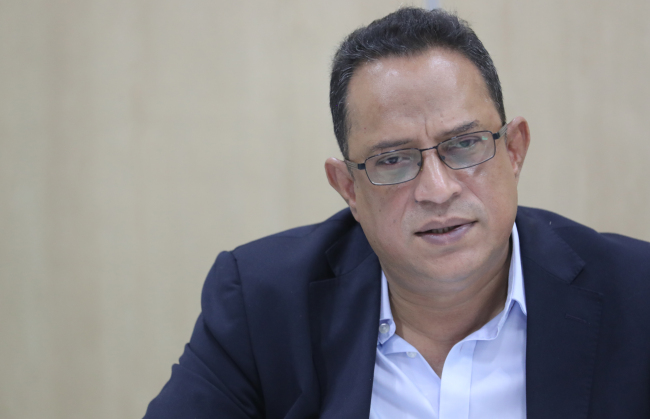Civic groups and some victims of toxic humidifier disinfectants remained bitterly opposed to the final compensation plan released by household products company Oxy Reckitt Benckiser on Sunday.
The victims and their families said they opposed the plan because the additional compensation still deviates from direct mention of responsibility and neglects victims with relatively less damage. They denounced it as “fake compensation.”
The company said the final plan was based on three rounds of talks with victims and their families, following its corporate values of “respect, fairness, transparency and accuracy.”
 |
Reckitt Benckiser head Ataur Rashid Safdar (Yonhap) |
Under the final plan, Oxy will compensate up to 350 million won ($315,787) to victims categorized upon government investigation as group one and two. Up to 1 billion won will be compensated for infant and child victims’ deaths due to the severity of suffering and the difficulty in calculating potential earning losses.
However, victims argued that the final plan does not cover all victims as it leaves out those classified under categories three and four, whose suffering were deemed less directly connected to Oxy’s products.
As of May, there were 309 victims of toxic humidifier disinfectants classified in categories three and four, compared to 221 victims in categories one and two. The scale goes from one to four, with the lowest being highly certain that health damage resulted from the use of toxic humidifier disinfectants.
“While more than half of victims are named in categories three and four, Oxy has not mentioned a single word about compensating them,” said Choi Ye-yong, the head of the Asian Citizen’s Center for Environment and Health during a press conference in Seoul on Monday.
He also added that the amount suggested by Oxy is far less than what should be paid when punitive damage is applied to the company. Current Korean laws do not recognize punitive damages.
Whether to pass the legislation on punitive damage has been a hot topic between rival parties as well as at the Supreme Court recently. The relevant bill is pending due to worries that it may cause double punishment for defendants.
The purpose of punitive damage is to punish the defendant for misconduct and deter the defendant and others from similar misbehavior in the future.
Companies may face compensation payment from two to three times more than the amount of victims’ damages.
Civic groups have been arguing that the recent cases of Audi Volkswagen Korea’s emission-rigging and Oxy Reckitt Benckiser’s distribution of toxic humidifier disinfectant should be punished based on punitive damages.
Meanwhile, Oxy Reckitt Benckiser -- formally renamed Reckitt Benckiser Korea since 2014 -- released its first newspaper advertisement in local dailies on Monday.
Along with an apology, the advertisement by RB Korea detailed the application process for victims to receive compensation from the company.
Starting August, each victim’s case will be analyzed by Oxy to finalize the compensation amount, considering the previous and future medical costs, potential earnings lost and emotional distress.
This kind of official apology by the company comes 4 years and 11 months after the first death from the use of Oxy’s toxic humidifier disinfectant.
By Kim Da-sol (
ddd@heraldcorp.com)







![[Today’s K-pop] Blackpink’s Jennie, Lisa invited to Coachella as solo acts](http://res.heraldm.com/phpwas/restmb_idxmake.php?idx=644&simg=/content/image/2024/11/21/20241121050099_0.jpg)
